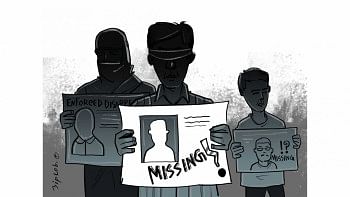A tit (Baluchistan) for tat (Kashmir)

The Indo-Pak bilateral relations have recently witnessed ratcheting up of rhetoric from both sides. And it seems that all holds are being applied in the diplomatic tussle between the two. Clearly India has assumed a more offensive approach in the diplomatic front vis-à-vis Pakistan which many see as a narrative scripted to counter the Pakistani policy and actions related to and in Kashmir.
A completely new front has been opened with India bringing in Baluchistan in the equation to thwart Pakistani rhetoric on Kashmir, an Indian riposte if you like, to Pakistan. What so far has been a feather-glove approach by India to the Pakistani position on Kashmir, the one-upmanship has come to involve a province of Pakistan. It is an Indian tit for Pakistan tat. But this stance, as reported in some Indian print media in October, 2015, has been in the works for a while without being articulated, as a policy of graduated response.
To put the matter in perspective it may be appropriate to cite the utterances made by both sides in recent times. And it all started with Burhan Wani's death in police firing on 8 July and the subsequent turmoil that has so far resulted in more than 60 deaths and nearly 5,000 injured in the Valley. Wani to India was a separatist and a terrorist and to Pakistan a freedom fighter. He has also been described as a new age militant in Indian Kashmir, driven to the ranks of militants by his experiences as a young kid of the treatment meted out to these fellow Kashmiris.
Not only did the government of Pakistan come out in full support of the Kashmiri separatist as they have done all along so far as a matter of policy, the Pakistan High Commissioner in New Delhi also restated this position at the Pakistan Day function in New Delhi on 14th Aug. To express support for a breakaway group on the soil of that country would be a diplomatic incivility, but the shield of technicality was invoked to show that the premises of the Pakistan High Commission were the territory of Pakistan. But be that as it may, there is no doubt that the incident has brought about a complete 'rerouting' of India's policy towards Pakistan.
India's new approach was perhaps inevitable and the first step was Prime Minster Modi's mention of Baluchistan from Delhi's Red Fort on India's Independence Day regarding Pak actions in its Baluchistan province and not forgetting to mention the fact that the people of this area (and of those of Pakistani Kashmir and Gilgit) have thanked him for keeping them in his mind and alluding to their condition. The appreciation of the Baluchi's is in reference to his warning last week that if Pakistan continued instigating violence in Kashmir Valley that has been going on since 8 July of this year, "India would be compelled to expose Islamabad's many wrongdoings in regions fighting terror and atrocities by its security forces."
Evidently, it is a quid pro quo which India has discovered as an effective riposte to Pakistan. But it also has clearly brought to the fore the two countries' policy of mutual destabilisation. For long Pakistan has been accusing India of fomenting trouble in that province. It has not been as if the separatist movement on Baluchistan is a new phenomenon. By some accounts there is a Bangladesh being replicated by the Pakistani military in Baluchistan. The current uprising goes back to the early seventies which the Pakistani establishment has not been able to put down completely. It has been going on since then as low intensity conflict led at various times by various groups like the Baluchistan People's Liberation Front (BPLF). Presently the Free Baluchistan Movement directed by the London-based Nawabzada Hyrbyair Marri, with a militant arm, Baloch Liberation Army (BLA), and Baloch Liberation Organisation (BLO), the political wing, which is leading the movement.
Exploiting the Baluchistan situation by India is a strategic alternative for it. And the presence of a BLO leader, Balaach Pardili, in India since at least 2009, who the Baluchis consider as their political representative in that country, and who reportedly, "addressed a gathering in New Delhi on October 4, 2015 reading out a statement from BLO's exiled leader Nawabzada Hyrbyair Marri" demonstrates India's disposition towards the Baluchi movement. Interestingly the historical circumstances of Kashmir and Baluchistan and their 'joining' India and Pakistan respectively have stark resemblance, and if Pakistan calls Kashmir a legacy of Partition, India on its part has started calling Baluchistan a legacy of Partition too.
What is occupying the mind of the South Asia watchers is the consequences of the likely fallout of the two countries and its effect on the region of South Asia as a whole, given that the security scenario in the region has always been influenced by the degree of the tension prevailing between the two countries at any particular point in time.
The writer is Associate Editor, The Daily Star.

 For all latest news, follow The Daily Star's Google News channel.
For all latest news, follow The Daily Star's Google News channel. 



Comments